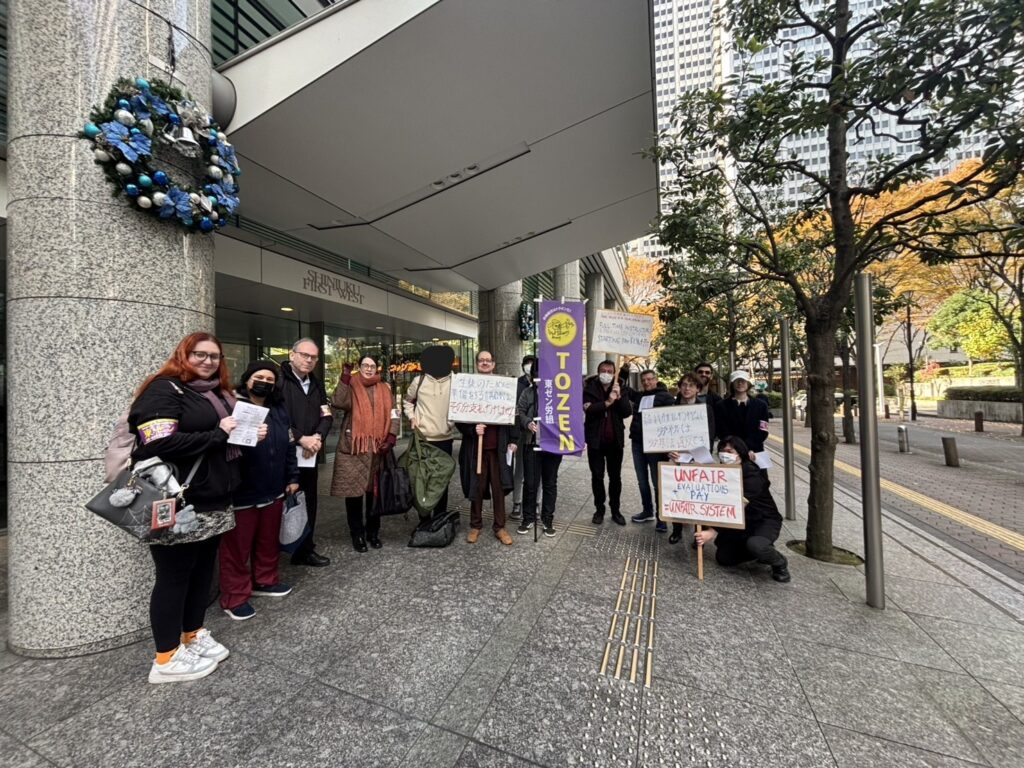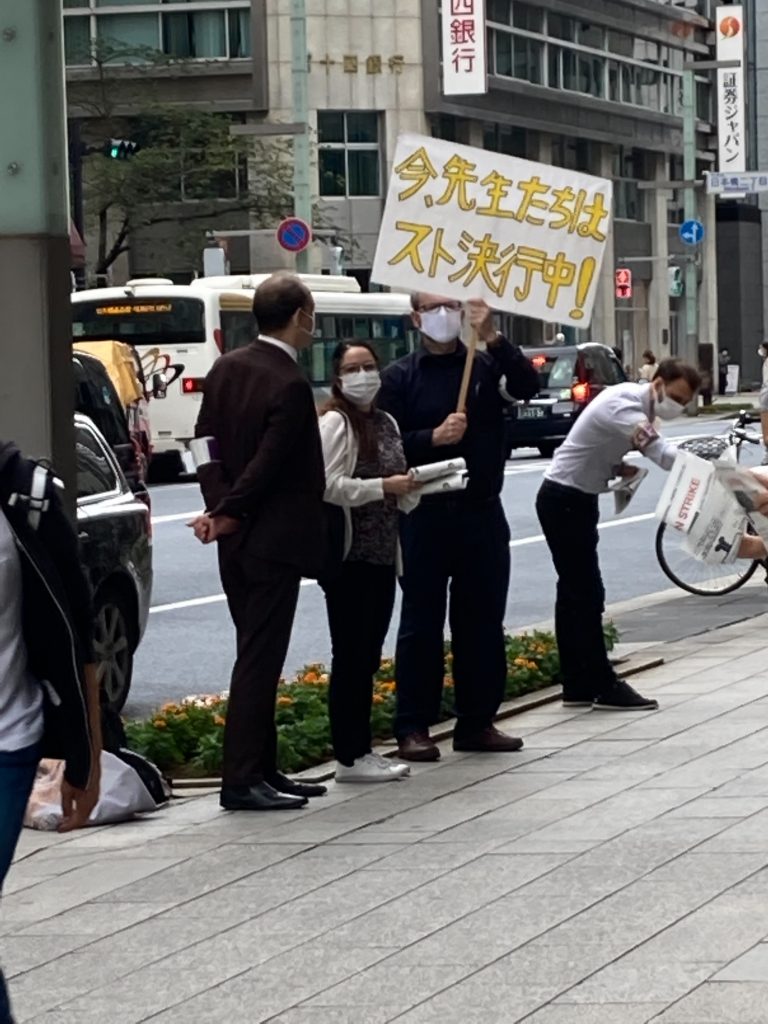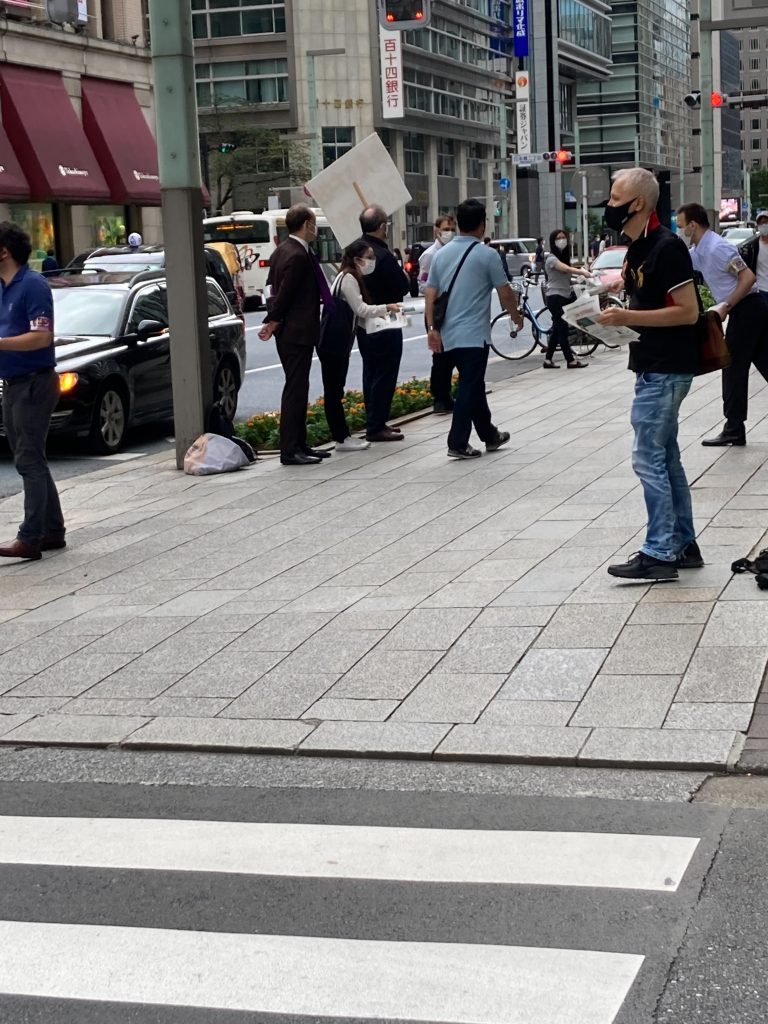On Thursday, 29 November, Tozen’s Begunto Union held a leafleting action in Shinjuku.

On Thursday, 29 November, Tozen’s Begunto Union held a leafleting action in Shinjuku.

On Monday 4th December 2023, members of Tozen’s Gaba local took to the streets to protest and fight for their wellbeing.
The video below includes speeches from organiser Louis Carlet, Gaba local President Musashi Sakazaki, and Gaba local General Secretary Mitch Brown.
東ゼン一日行動(上)
神田にあるシェーン英会話本社前で抗議行動を始めした。
The first part of Tozen’s All Day Protest.
Starting with the Shane Worker’s Union protesting at Shane English School Head Office in Kanda, Tokyo.
東ゼン一日行動(中)
神田にある神田外語大学院前で抗議行動を始めした。
The second part of Tozen’s All Day Protest.
Kanda University of International Studies (KUIS) Union protesting at Kanda University of International Studies in Kanda, Tokyo.
東ゼン一日行動(下)
銀座にあるインタラック本社前で抗議行動を始めした。
The third part of Tozen’s All Day Protest,
Interac Union protesting at Interac HQ in Ginza
On Saturday 25th September 2021, Tozen’s local, Begunto held a leafleting action in Nihonbashi.
Begunto recently entered into a dispute, and members are fighting for the reinstatement of our member Matt Wiegand.
2021年09月25日(土)、日本橋で東ゼン労組のベグント支部はビラを配った。
最近、ベグント支部は労働紛争に入って、 マット組合員の復職を求めて闘っている。


Victory!
The Central Labor Relations Commission ruled on Thursday March 29th that Japan College of Foreign Languages (JCFL, a division of Bunsai Gakuen) had illegally interfered with Tozen Union’s leafleting actions in front of the school.
Tozen Union and its JCFL Local argued that management interfered with legitimate union activity by sending employees out to block the union from passing out leaflets at two separate leafletings in 2013.
In January of 2016, Tokyo Labor Relations commission ruled in favor of the union’s petition, ordering management to cease all such interference and to post a large sign apologizing to the union at the workplace for ten days. Management immediately appealed. That appeal was formally rejected on Thursday.
The victory was thanks to the relentless struggle of the local.
The Tokyo District Court handed down its verdict in the Fujibi case last February, with the Tokyo High Court upholding it in July. On both occasions, I couldn’t believe my ears. The courts ruled that labor union Zenrokyo Zenkoku Ippan Tokyo Rodo Kumiai (Tokyo Roso) had committed defamation and damaged the creditworthiness of Fujibi, a medium-size artwork printing company.
Articles 1.2 and 8 of Trade Union Law explicitly exempt labor unions from civil and criminal liability when conducting legitimate labor union activities. This has been broadly interpreted thus far to give unions extraordinary leeway to dish out harsh criticism of their employers, whereas normally such public criticism would constitute illegal (possibly criminal) defamation (meiyo kison) or obstruction of business (gyōmu bōgai). Consumer boycotts are illegal (possibly criminal), whereas strikes by workers are protected by the Constitution, even if they hurt the business.
So these courts ruled that Tokyo Roso’s actions were not legitimate union activities. What were the actions and what led to these verdicts?
2015年12月15日、私たち、全国一般東京ゼネラルユニオンJCFL支部は、東京都労働委員会で大きな勝利を得ました。
JCFL Members braved the rain and management harassment on Thursday, January 22 to conduct a recruitment leafleting to in front of the JCFL Takadanobaba campus during their lunch break.
At 12:30, Case officer Gerome Rothman and three union members arrived at the front gate. They began leafleting instructors and staff.
Shortly after the union began, management deployed several non-union staffers to interfere with the leafleting. Management first told the union they would call the police. The union responded by insisting management stop interfering with our legitimate union activity.